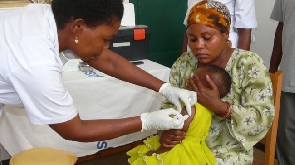According to world statistics, more than 400,000 deaths are attributed to malaria each year. Ghana records an estimated 11,070 malaria deaths with that of under-five mortality pegging at 5,607.
Information also suggests that African children are at highest risk of dying of malaria and malaria accounted for more than 265,000 deaths of children in Africa in 2019.
Malaria control requires the deployment of many tools. In addition to long-lasting insecticide-treated nets and other malaria control measures in use, malaria vaccination is being piloted in three countries in Africa including Ghana, Kenya, and Malawi.
The malaria vaccine is called RTS,S and eligible children receive four doses of it at specified times.
In Ghana, the RTS,S vaccination is ongoing in 42 Districts in seven regions and it is administered to eligible children who receive the vaccine from the age of 6 months, with the final dose given at 24 months of age.
North Dayi, located in the Western part of the Volta region, is one of the 42 Districts where the malaria vaccination programme is currently being piloted.
McAnthony Dagyenga visited the North Dayi District to ascertain how the District is progressing with vaccination against malaria.
Johnson Ahiabu is a community health nurse working under Vakpo Todzie CHPS in the North Dayi District. As a community health nurse, he specialises in child health and delivers health services for children, including vaccinations, home visits and distribution of insecticide nets among others.
According to him, despite the daunting challenges he had to go through to render his services, especially malaria vaccination to children in his catchment area, which is quite remote, he was excited to execute his calling.
“It is fun and what I really enjoy about it is we are rendering service to humanity and to protect our younger ones from malaria. To me, I have the privilege of having a motorbike so I use one of the motorbikes to the outreach point. It is an official duty bike assigned to me.
“From the office to the communities there are challenges and they vary from one point to the other. Some, the roads are good, some the roads bad. Some areas too are marshy areas with water under the grass and you would have to move to that community so that those there too can enjoy healthcare. Sometimes you would have to park the motorbike and walk to the communities,” he said.
Johnson Ahiabu indicated that initially, parents had fears that with the advent of coronavirus and were reluctant to bring their children for the vaccination.
“Covid-19 came with a lot of anxiety in the communities; so they were much more concerned about the security of the children. But we kept on giving them education as to how they are going to approach our services; that is putting on nose masks and washing of hands and other things.
“With RTS,S, all depends on the information that you give to the mothers. Sometimes they listen to the TV and all that. Sometimes too they get their information from social media about the vaccine.
“Before the start of the RTS,S there was a community durbar where we educated them about the vaccine. We talked about how it came about, what it is going to prevent which is malaria and how the doses are scheduled. So because they had this upfront information, they easily allowed you to vaccinate their children with the RTS,S.
“No child has come with any adverse reaction. My advice will be that all nursing mothers and care-givers should vaccinate their children with the RTS,S vaccine,” the community health nurse said.
On his part, the Disease Control Officer who doubles as the Coordinator for the Expanded Programmes for Immunisation (EPI) for North Dayi District, Michael Eshun, stressed that malaria vaccination was smoothly ongoing in the District.
“So far so good, we have done a lot with the vaccination. It is only a few challenges we do encounter. Some of the parents are saying the vaccinations are too much. They say we are needle pricking their children to much. Every day we are adding. But upon education, now all those parents are understanding.
“We have made them to understand that it is not pains that we want their children to go through but that we want their children to be immune to all those diseases around us..
“We have explained to them and they understood us,” Michael Eshun assured.
The North Dayi District has so far recorded zero malaria-related deaths since 2017. Even though there was some marginal increase in cases from 2017 to 2020, Michael Eshun indicated that cases among under-five-year-olds saw rather a downward statistical trend.
“In 2017, confirmed malaria cases were 10,042 with no death. In 2018, confirmed cases were 10,281 with no death and in 2019, we recorded a total of 12,583 confirmed cases where as a total of 8,266 confirmed cases were recorded in 2020. There was no death recorded for malaria in those years as well,” he said.
For the Medical Superintendent of the Catholic Hospital at Anfoega in the North Dayi District, Dr. Richard Loglo, one of the key solutions that have helped reduce malaria deaths and cases among children at his hospital and the District as a whole is the distribution of nets and introduction of the malaria vaccination programme, among other things.
“The education that goes on in the communities and the distribution of the free mosquito nets also helped to curb the incidence of malaria.
“But we also know that there is a vaccination programme that has been embarked upon from 2019. We have really noticed that there has been a drastic reduction in admission of children. We believe that the vaccination has also played a major role in the reduction of malaria cases in children,” Dr. Loglo expressed.
A nursing mother, Celestina Essel, who had brought her six-month-old baby to take her first dose expressed happiness saying that, “I am happy my daughter will be protected against malaria.”
The African Media in Malaria Research Network (AMMREN) has been spearheading media advocacy in eliminating malaria in Ghana and in Africa as a whole.
Health News of Tuesday, 20 April 2021
Source: McAnthony Dagyenga, Contributor

















